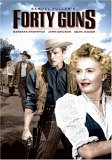| Reviews & Columns |
|
Reviews DVD TV on DVD Blu-ray 4K UHD International DVDs In Theaters Reviews by Studio Video Games Features Collector Series DVDs Easter Egg Database Interviews DVD Talk Radio Feature Articles Columns Anime Talk DVD Savant Horror DVDs The M.O.D. Squad Art House HD Talk Silent DVD
|
DVD Talk Forum |
|
|
| Resources |
|
DVD Price Search Customer Service #'s RCE Info Links |
|
Columns
|
|
|
Forty Guns
Like Ali Baba, Jessica Drummond (Barbara Stanwyck), decked-out out in black from head-to-tow and riding a white stallion, leads a veritable army on horseback, forty gunslinger-thieves who storm across the rolling hills of the Arizona Territory, leaving great plumes of dust in their wake. Caught in this are lawmen Griff Bonnell (Barry Sullivan), brother Wes (Gene Barry) and greenhorn kid brother Chico (Robert Dix). When aging (and nearly blind) town marshal John Chisum (Hank Worden, apparently not playing the historical Chisum) is shot dead by Jessica's brother, Brockie (John Ericson), and Brockie drunkenly shoots up the town with several juvenile delinquent-type friends who've also robbed the mails, Griff becomes determined to bring the young gun to justice.
But rancher Jessica all but owns the town and as her devoted lackey, Sheriff Ned Logan (Dean Jagger), tries to clean up Brockie's mess, Jessica and Griff, both aware that progress is making their violent type Western life outmoded, begin a passionate romance.
Though it loses some steam in its second half, particularly in the motives and means of a few of its secondary characters, Forty Guns is visually stunning and filled throughout with little touches that continually set it apart from the usual Western. Fuller uses a wide range of stylized angles, including even a point-of-view shot through the barrel of a gun, anticipating the iconic image from the 007 movies. There's even a tornado, effectively realized. That Fuller wrung this much style out of its very low (just $300,000) budget is a testament to his craftsmanship.
For all its hyperbole, certain visual aspects capture the look of the Old West quite authentically. One brief scene is set in front of a saloon that has burned down; the characters don't refer to the building, it's just there, in the middle of town, an acknowledgement that such fires were routine. This may be the first Western in which a dead man's corpse is put on display in a funeral parlor window, standing upright in his coffin, an idea later effectively reworked by Clint Eastwood in Unforgiven (1992).
An early confrontation between Griff and Brockie occurs just after Griff has bathed, and while Brockie is drunk and disheveled, Griff is so clean he still carries a white towel around his neck, making for an interesting contrast. A final shootout between the two is shocking, violent, and original. (Fuller had a fondness for the name Griff; the name turns up in at least five other films of his, including House of Bamboo and The Big Red One.)
One scene that must have really shocked 1958 audiences involves the fairly graphic death of a minor character. The death is treated quite realistically for the time, and while no blood is visible, the character dies foaming at the mouth and with his eyes wide open.
Jidge Carroll, who passed away just last month, sings two ballads on camera, which Fuller treats with surprising tenderness. The second ballad, "God Has His Arms around Me," is a model of cinematic simplicity, dramatized via a simple tracking shot beginning with a medium, low-angle view of a new widow standing next to a polished, horse-drawn hearse, left to Carroll and back again.
The film is as unapologetically dirty as was possible in 1950s Hollywood. Some of the film's most outrageous dialogue is spawned of a romance between cigar-chomping Wes and Louvenia (Eve Brent), a tough-talking lady gunsmith straight out of a Howard Hawks movie. "I'd like to stay around long enough to clean her rifle!" Wes says. Similarly, as Jessica admires Griff's pistol: "May I feel it?" she asks. "It might go off in your face," he warns. "I'll take a chance." The banter throughout is on this level, with endlessly quotable dialogue: "I was bitten by a rattlesnake...when I was fifteen," says Jessica. Griff's reply: "I'll bet that rattler died."
Video & Audio
Presented in a near-flawless 16:9 anamorphic transfer, the black and white, CinemaScope Forty Guns looks outstanding, rendering the full frame version on the other side of no interest at all except for those who can't abide letterboxing. The English Dolby Digital 4.0 stereo sound mostly benefits the musical passages. English and Spanish mono tracks are there for those who want them, along with optional subtitles, also in English and Spanish.
Extra Features
The only supplement is a blood-and-thunder Theatrical Trailer, appropriately narrated by Paul Frees. Also in 16:9 anamorphic format, the trailer is complete with text.
Parting Thoughts
This has been a great month for Sam Fuller fans, what with this, House of Bamboo and the "reconstructed" The Big Red One out on DVD within of month or so of one another. Forty Guns is a real find but a title that could easily get lost in the shuffle, so anyone interested in the director's work is advised to seek out this tale of a "high ridin' woman with a whip." Highly recommended.
Stuart Galbraith IV is a Los Angeles and Kyoto-based film historian whose work includes The Emperor and the Wolf -- The Lives and Films of Akira Kurosawa and Toshiro Mifune. His new book, Cinema Nippon will be published by Taschen in 2005.
|
| Popular Reviews |
| Sponsored Links |
|
|
| Sponsored Links |
|
|
| Release List | Reviews | Shop | Newsletter | Forum | DVD Giveaways | Blu-Ray | Advertise |
|
Copyright 2024 DVDTalk.com All Rights Reserved. Legal Info, Privacy Policy, Terms of Use,
Manage Preferences,
Your Privacy Choices | |||||||













